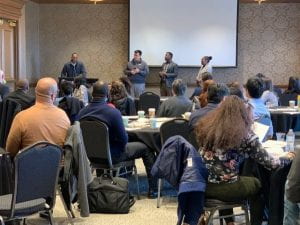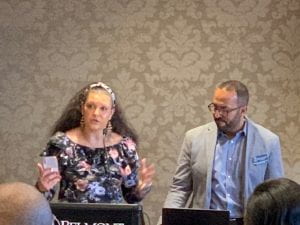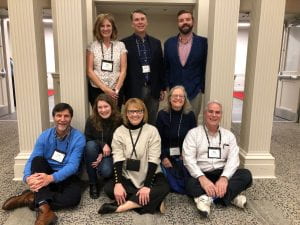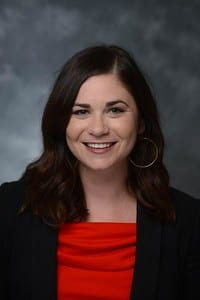
In a recent Teaching Center workshop, participants discussed how to see and cultivate critical thinking in the classroom. As part of this workshop, Jeremy Lane, director of the School of Music, offered a 4×4 matrix of critical thinking focused on identifying critical thinking, discerning its unique characteristics, developing critical thinking in the classroom, and assisting students in demonstrating critical thinking.
- Four Challenging Questions in Teaching Critical Thinking…
-
- Critical thinking is deceptive: Sometimes what may look like critical thinking may actually not be. How can we ensure that what they are doing (and what we are doing) is developing and promoting critical thinking?
-
- Defining critical thinking can be vague: Identifying specific outcomes related to critical thinking can be an elusive task. How can we know what to look for, and how can we describe critical think when it happens?
-
- Critical thinking may appear to students as irrelevant: Students may not always grasp how critical thinking relates t their discipline. How can we engage our students by stressing the relevance of critical thinking to their academic, artistic, and research work?
-
- Collegiate curriculum not always conducive to critical thinking: A four-year collegiate curriculum packed with classes doesn’t always allow students to attempt activities or projects multiple times, reflect on success and failures, or think through processes deeply before engaging. How can we overcome some of the systematic hurdles in order to develop critical thinking?
- Critical thinking may be deceptive, but it always involves these elements…
-
- Transfer: Critical thinking always involves the transfer of skills/knowledge learned in one setting into a new, different setting.
-
- Synthesis: Critical thinking always involves the synthesis of knowledge & skills learned across varying settings and applies them appropriately.
-
- Contextual awareness: Critical thinking requires an awareness of the context in which the student is engaging , and the ability to discern how context influences choices and actions.
-
- Flexibility/adaptability: Critical thinking requires the ability to adapt and adjust in the moment, and a willingness to change predetermined plans as need to accomplish the intended outcome.
- Four strategies to develop critical thinking in your class today…
-
- Accomplished learner: Define the behaviors/actions of the ideal student – what does the ‘A’ student know and do? Make this a priority of your planning before instruction begins.
-
- Time for reflection: Build reflection-based activities as frequently as possible – even something as simple as a 10-minute group reflection on a recent project can really help students process and grow for their experience.
-
- Leverage existing activities: Don’t try and create new experiences – look at what you are already doing & see what can be tweaked or transformed into a deeper-level learning experience.
-
- Force the issue: Develop class activities that force students to demonstrate transfer, flexibility, synthesis, and contextual awareness. As you do this, draw students attention to it – be very overt & intentional about letting them know what you are doing.
- A four-tiered strategy for students to demonstrate elements of critical thinking…
-
- Perform: Develop an activity that allows students to do something authentic to their discipline – a research project, a performance, a speech – whatever is appropriate for the discipline being studied that allows students to do something.
-
- Describe: Once the student has done something, then ask them to describe what they did – how the approached the activity, the thought process on how they made their choices, and their perceptions on how well they did.
-
- What was learned: Provide the student with an opportunity to describe what they learned – were their preconceptions that changed? Skills that improved? A process that was developed or refined?
-
- What will be used moving forward: Allow the student to reflect on what the learning experience meant, and how they can use the experience to guide future actions.




